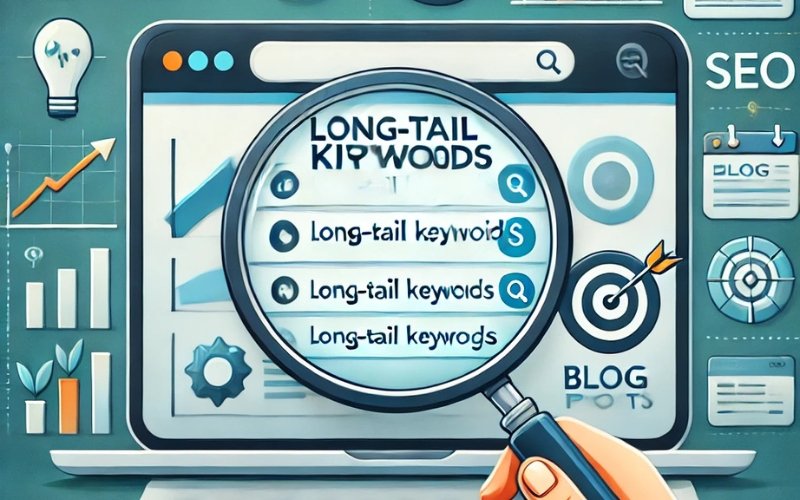In the world of Search Engine Optimization (SEO), keywords are essential to driving traffic and improving visibility on search engines. While targeting broad, high-competition keywords is a popular strategy, focusing on long-tail keywords can be even more effective for many businesses. Long-tail keywords are highly specific phrases that target a smaller, more focused audience. Blogging is an ideal platform to integrate these long-tail keywords into your content and help your website rank higher in search engine results. Here’s why targeting long-tail keywords through blogging is a crucial part of your SEO strategy.
What Are Long-Tail Keywords?

Long-tail keywords refer to specific and detailed search phrases that users often input when they are seeking highly targeted information or are closer to making a decision, whether it’s purchasing a product or finding a solution. These phrases typically consist of three or more words, providing more context and precision than generic, broad keywords. For example, instead of searching for “laptops,” a user might look for “affordable laptops with long battery life for students.” This level of specificity allows businesses to connect with an audience that has a clearer intent and more defined needs.
One of the key advantages of using these descriptive phrases is their ability to target niche audiences effectively. When someone searches for a specific phrase, it often reflects a particular intent or requirement. This means that a website optimized for such terms is more likely to attract visitors who are genuinely interested in its offerings. For instance, a user searching for “eco-friendly cleaning products for kitchens” is more likely to convert into a customer compared to someone searching for the broad term “cleaning products.”
Why Are Specific Phrases Important for SEO?
These targeted search phrases are essential for businesses trying to improve their visibility in search engines. Broad keywords like “marketing” or “shoes” are not only highly competitive but also fail to provide a clear picture of user intent. Optimizing content for specific phrases allows websites to bypass the heavy competition associated with broad keywords. Moreover, search engines prioritize relevance, and these detailed phrases often lead to higher-quality traffic because the content aligns closely with what the user is looking for.
Additionally, search engines like Google have advanced algorithms that focus on delivering accurate and meaningful results. By optimizing your content around specific search phrases, you’re not only making it easier for users to find your content but also signaling to search engines that your page is highly relevant to the query. This can lead to better rankings and increased organic traffic over time.
Practical Benefits for Content Creators
For content creators, incorporating specific search phrases helps in generating more targeted ideas for blog posts, articles, or videos. A phrase like “how to choose the right running shoes for flat feet” can inspire a detailed guide or product review tailored to that query. This approach ensures that the content serves a purpose, addresses a clear audience, and stands out amidst the competition. Over time, creating content around such phrases can position a website as an authority in its niche, attracting loyal readers or customers.
In summary, using detailed and specific phrases in your SEO strategy provides a clear pathway to connect with users searching for highly relevant information. These phrases cater to a precise audience, reduce competition, and enhance the likelihood of achieving conversions, making them a valuable tool for any digital marketing strategy.
Why Long-Tail Keywords Matter for SEO
Long-tail keywords offer several benefits when it comes to SEO. First, they typically have lower search volumes but higher intent. Users who search using long-tail keywords are often looking for specific information, making them more likely to engage with your content or convert into customers.
Additionally, by targeting long-tail keywords, you face less competition from other websites. This means you have a greater chance of ranking on the first page of search results, which can lead to more organic traffic.
Another advantage is that long-tail keywords often align with voice search, which has become increasingly popular with the rise of smart speakers and mobile devices. People tend to ask questions or speak in longer phrases when using voice search, so optimizing for long-tail keywords can help your blog appear in these results.
Blogging as the Perfect Platform for Long-Tail Keywords

Targeting long-tail keywords is an essential strategy in SEO, and blogging provides the ideal platform to implement this approach. Unlike generic keywords, long-tail keywords are more specific and often less competitive, making them easier to rank for. Consistent blogging allows you to focus on these keywords systematically, enabling you to cover a wide array of topics that resonate with your audience.
Why Blogging Works for Long-Tail Keywords
Blogging gives you the flexibility to create content tailored to specific audience queries. Each blog post can focus on a single long-tail keyword or a related group of keywords, ensuring that your content addresses the exact needs of users. For instance, instead of creating a generic post on “Travel Tips,” you can target a specific audience by writing about “Travel Tips for Solo Female Travelers on a Budget.” This specificity increases the likelihood of ranking for those search terms while also attracting a highly targeted audience.
By addressing niche topics, you not only optimize your website for search engines but also position yourself as an authority in your industry. Readers searching for detailed answers or solutions are more likely to find and engage with your content when it directly addresses their needs.
Answering Specific Questions
One of the primary benefits of blogging is its ability to address specific questions that your target audience is asking. Long-tail keywords often take the form of queries, such as “How to start a blog for small businesses” or “Best strategies for email marketing in 2024.” Writing blog posts that directly answer these questions can drive high-quality traffic to your site.
For example, a blog post titled “How to Start a Blog for Small Businesses in 5 Easy Steps” targets a clear, specific audience. Such content is not only helpful but also aligns closely with search intent. When readers find content that answers their questions, they are more likely to stay on your site, reducing bounce rates and signaling to search engines that your content is valuable.
Boosting SEO with Long-Tail Keywords
Incorporating long-tail keywords into your blog content helps search engines understand the context of your posts. Long-form articles naturally provide opportunities to use these keywords in headings, subheadings, and throughout the text, increasing the relevance of your content. Moreover, search engines prioritize content that thoroughly answers user queries, giving your blog a higher chance of ranking on the first page of search results.
Blogging also allows you to target multiple related long-tail keywords within a single post. For instance, in a post about “Healthy Recipes for Busy Parents,” you can include variations like “quick healthy recipes for working moms” or “meal prep ideas for busy families.” This broadens your content’s reach and helps attract a diverse audience while staying relevant.
Building Authority and Trust
When your blog consistently provides detailed, high-quality answers to niche questions, it establishes your brand as an authority in your industry. Readers are more likely to trust and return to a site that regularly addresses their concerns or interests. This trust not only helps in building a loyal audience but also encourages social sharing and backlinks, both of which further improve your SEO.
Attracting the Right Audience

Long-tail keywords are not just about driving traffic; they are about attracting the right traffic. When you use highly specific phrases, you are more likely to reach users who are ready to take action. For example, someone searching for “best eco-friendly office supplies for small businesses” is more likely to be looking to make a purchase compared to someone who searches for “office supplies.”
By targeting long-tail keywords in your blog posts, you attract users who are closer to converting, whether that means making a purchase, signing up for a service, or engaging with your brand in other meaningful ways.
Conclusion
Long-tail keywords are a powerful tool for driving targeted traffic and improving your SEO efforts. Blogging offers the perfect platform to incorporate these specific keywords into your content and attract a more engaged, ready-to-convert audience. By focusing on long-tail keywords through regular blog posts, you can boost your website’s visibility, rank higher in search results, and connect with users who are actively searching for the solutions your business provides.

